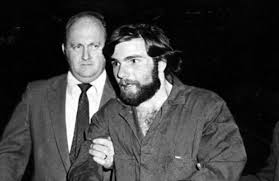We have all heard the infamous story of the Amityville horror, the alleged “haunted” house along the south shore of Long Island, New York. The reason for its boom in publicity started with the Lutz family incident and their claims that the house was haunted, although that isn’t where the story actually began. On November 13, 1974, Ronald DeFeo Jr. murdered his entire family with a .35- caliber Marlin rifle as they slept. This started an investigation since DeFeo had gone to work after the crime and acted as if he had no idea what had happened. He claimed that he went home from work and found his family members dead, after which he ran to the nearest bar screaming for help. Although he acted as if he had nothing to do with the murder, the town already had suspicions about him because of his background. As a kid, DeFeo was abused by his father and bullied in school, which resulted in a troubled childhood. He had quite the history with alcohol and drug abuse, several arrests due to violent fights he had gotten himself into, and as a child, had once pulled a gun on his father, but it jammed.1

It didn’t take long for him to become the prime suspect, and he was quickly arrested and taken into custody. DeFeo’s trial began October 14, 1975, close to a year after the murder, and William Weber had been put on the case as his defense attorney. DeFeo claimed he had heard voices in his head telling him to kill his family. With that information, Weber decided to use a strategy that he believed would give DeFeo a lot less time in jail. Weber insisted on an insanity plea, promising DeFeo that he would be out in five years. He believed this was the best approach, considering DeFeo’s wide range of different versions of the story, which proved that he must have been insane. Unfortunately, this plan did not work, for the jury believed that even though he wasn’t mentally stable, he was completely aware of the situation and motivated by a self-centered attitude. The jurors found DeFeo guilty on November 21, 1975, and sentenced him to six consecutive life sentences.2

Courtesy of Wikipedia
Not long after his imprisonment, films, novels, and documentaries came out about the murder incident. The Lutz family had moved into the house a little over a year after the murder, but they only stayed for twenty-eight days, leaving in the middle of the night with just a few days worth of clothes. They completely abandoned the Amityville house, never wanting to step foot in it again, and didn’t even want to reclaim any of the belongings they left behind. In September of 1977, The Amityville Horror: A True Story started the supernatural phenomenon when it took into account the Lutz family and their experiences.3
With this book, the story rapidly gained publicity, and started a controversy over whether the haunting was a hoax. William Weber wanted to use this popularity to his advantage. He began by using the popularity to try and open DeFeo’s case again. However, for an unknown reason it was never filed and DeFeo continues to be incarcerated at a correctional facility in Fallsburg, New York. Weber then reached out to the Lutz family, attempting to convince them to partner up on a book deal on the DeFeo case for a large advance. He often spoke with them although he was reluctant to work with them, but once they had heard he was planning to split the royalties with DeFeo, they cut Weber out of any future deals and were no longer on speaking terms. As he carried on by himself, the Lutz family sued the writer Weber enlisted to write the book for an invasion of privacy, settling the suit in 1979—causing the plan to fall through.4
This upset Weber, who was prepared to call out the family, claiming “it was was all a lie” while at the same time wanting to take credit for some of the creativity in it. Going to the press, he explained that the entire story was created over a bottle of wine between Mr. and Mrs. Lutz, even though they still claimed to have some sort of supernatural experience. It was only with his help that they started to exaggerate the details with the murder evidence that Weber had provided them. He eventually sued the Lutz family for $60 million, stating they were “stealing ideas.” The suit settled for $2,500. Even though William Weber’s plans to make a large profit didn’t go the way he wanted them to, he still managed to get a total profit of $15,000 for his connections with the book and movie.5
- Mike Mayo, “DeFeo, Ronald, Jr.” American Murder, (2008): 23- 52. ↵
- Ric Osuna, The Night the DeFeos Died: Reinvestigating the Amityville Murders (Xlibris Corp, 2002), 84-92. ↵
- Jay Anson, The Amityville Horror (New York : Pocket Star Books, 2005), 67. ↵
- New York Times. 2006. s.v. “George Lutz, 59; Found Horror in Amityville.” ↵
- Patricia D. Netzley,. “Amityville Haunting” The Greenhaven Encyclopedia of Paranormal Phenomena, 2006. ↵



47 comments
Malleigh Ebel
Weber’s plan seeking to make a profit seems fairly accurate to the heart of most people, especially if your client is likely to be guilty. I had heard of the story of Ronald DeFeo killing his whole family, but I did not know his background of abuse. It makes me sick that Defeo’s attorney was unable to help him, and then tried to make a profit from the incident.
Cristianna Tovar
Although I had heard about the Amityville horror before, this article gave lots of insightful information about its background that I had no idea about before reading it, such as the murders that took place within its walls. It’s hard to believe that someone would try to make a profit out of a serious situation like Weber did, considering he was DeFeo’s attorney, but selfishness and a hunger for money can cause a person to do inexplicable things. Overall, this was a very informative read!
Nelly Perez
This is the first time for me about reading the story mentioning Amityville because I never heard much of it. William Weber really tried to get some profit out of DeFeo’s case since he lost. People were already suspicious of DeFeo and with Weber giving the suggestion, it just was not going to work.
Sydney Hardeman
I knew a little about the story of the Amityville horror and the haunting of that house, but had no idea about the actual crimes and supernatural experiences that took place in that house. It is also crazy that with the family’s experiences, Weber was able to capitalize and use them in that way. This was an interesting article to read and I think you did a good job of highlighting the horrors of the house and the murders, alongside Weber’s selfishness.
Nicole Ortiz
I had previously known about the Amityville horrors that happened in that house but i had never known until now, the actual story behind those ghost experiences. It’s crazy to see how there’s always an untold background to each one of these haunted locations, even including this one. But after reading this article, its so sad to see how far some people will go just to get money like William Weber had done.
Victoria Davis
The writer did a good job giving background information about Ronald and his childhood. This information was really important to have to show the circumstances. It is so sad how his lawyer was truly deeply involved for the money instead of helping the family get justice and the man the help he needed. The article had a plot twisting ending with unexpected information.
Kathryn Martinez
I knew about the hauntings of the house as it is widely popular and can still be seen to this day. However, I was very unaware of the real crimes that happened in that house as many people do not know. This made for a very interesting article and it really goes into the depth of questioning. It begs the question if DeFeo deserves to have a re-trail if the court is able to prove that Weber was only in the defense for the money. But it also calls into question of the general popular option that he did it, and whether he even should be allowed to file for re-trail.
Hannah Hennon
This article does good at giving another perspective on the Amityville horror. It is interesting how much a person is willing to do to make money. It is crazy to think that someone would want to try to make money off someone killing his whole family. Then to want to call it a lie when other people do not want to be apart of what he is trying to do.
Vanessa Quetzeri
I have heard about the Amityville Horrors, but not from this angle. I feel most people are more focused on the hauntings rather than the history behind them. I for one did not know that Weber’s attorney was trying to make a profit over the Lutz’s family’s incident. At that point, he was pulling at strings to make money and unfortunately did.
Cynthia Perez
It’s sickening how people are actually out there trying to profit off of the murders Ronald DeFeo Jr. caused to his own family. However I admit that I like how this article focused on that aspect of the Amityville horror, behind that gruesome act of evil, there were people actually scheming out ways to market from such a dark event. Making the whole ordeal insignificant unless it obtained an investment between the attorney and the Lutz family. This article was very worthwhile in giving us a new perspective of something unexpected.